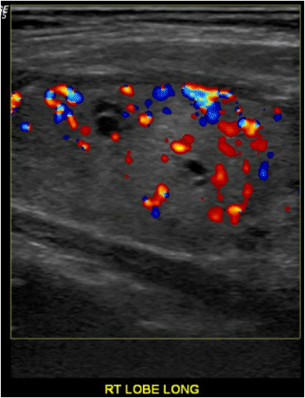Common Thyroid Disorders That Could Go Undetected
What is thyroid disease?
The thyroid is an important gland of the body whose hormones (T3 & T4) control various other important systems in the body, such as impacting metabolism by controlling the rate of burning calories and heartbeat.It is a butterfly-shaped organ that’s located in the neck region, just above the collarbone. Having said that, any medical condition that makes the thyroid gland produce too much or too little amount of these hormones is said to be thyroid disease. It is very common, about 20 million people in the United States are said to have some type of thyroid disease. And women tend to have it more than men(Professional, 2020).
What conditions can cause hypothyroidism and hyperthyroidism?
Hypothyroidism:When thyroid hormones are released in inadequate quantities or not released at all then this condition is known as hypothyroidism. Medical conditions that can cause hypothyroidism include:
- Thyroiditis : An inflamed and swelled up thyroid gland because of which the amount of thyroid hormone production is lowered to being insufficient.
- Hashimoto’s thyroiditis:This is a hereditary autoimmune disease that causes the body’s own cells to attack the thyroid gland.
- Postpartum thyroiditis: This type of thyroiditis affects up to 9% of women after childbirth, and it is mostly a temporary condition.
- Iodine deficiency: The mineral iodine is required for the creation of thyroid hormones, therefore iodine deficiency results in less production of thyroid hormones.
- A non-functional thyroid gland: This condition is present by birth in about 1 in 4,000 newborns. This is why newborns are checked through thyroid function tests, otherwise if left untreated then they may develop physical and mental disabilities in the future.
Hyperthyroidism : When thyroid hormones are produced in heightened quantities then this condition is known as hyperthyroidism. Medical conditions that can cause hyperthyroidism include:
- Grave’s disease : This is the most common reason for hyperthyroidism. In Grave’s disease, the immune system produces antibodies that cause the thyroid gland to produce more and more amount of T4 hormone than it is needed, and over activates the thyroid gland and makes it enlarged as well. These antibodies then attack the tissues of the eyes and can make them inflamed, a condition known as thyroid eye disease(Thyroid Disease, 2020).
- Nodules : Often,non-cancerous adenomas/nodules develop in the thyroid.They produce thyroid hormones independently,and do not respond to the thyroid hormone controlling feedback system. This is calledPlummer's disease/toxic adenoma. These nodules will cause part of the thyroid gland, where they are present, to swell up.
- Thyroiditis : In this condition, the thyroid hormones that are stored in the thyroid gland are all released into the bloodstream when it is largely damaged. This condition canarise because of an autoimmune disease or a viral or bacterial infection(Thyroiditis, n.d.).
- Excessive iodine : Iodine is present in excessive amounts in certain medications such as cough syrups. Therefore, when you introduce excessive iodine in the body, this causes the thyroid gland to make increased amounts of thyroid hormones.
What are some common complications of chronic thyroid disorders?
Although the symptoms of hyperthyroidism and hypothyroidism are different from each other, some common complications include(Staff, 2020):
- Goiter
- Mental health issues
- Infertility
- Myxedema (hypothyroidism)
- Birth defects
- Heart arrhythmias and other heart problems
- Weight management issues
- Peripheral neuropathy (hypothyroidism)
- Issues with the menstrual cycle
- Fatigue
What are the symptoms of hyperthyroidism?
They include(Professional, 2020):
- Nervousness
- Vision problems
- Increased heartbeat
- Weight loss
- Trouble in sleeping
- Goiter
- Muscle tremors and weakness
- Sensitivity to heat
- Irregular menstrual cycle
What are the symptoms of hypothyroidism?
They include(Professional, 2020):
- Weight gain
- Forgetfulness
- Fatigue
- Coarse hair and hair loss
- Frequent and heavy menstruation
- Voice hoarseness
- Sensitivity to cold temperature
What are the risk factors of thyroid diseases?
- Having type 1 diabetes, rheumatoid arthritis, Sjogren’s syndrome, Turner syndrome, lupus, pernicious anemia, or primary adrenal insufficiency
- Family history of thyroid disease
- Increased iodine intake (through medications)
- Inadequate iodine intake
- 60+ age, especially if you are a female
- Having had thyroid treatment in the past
Why is early detection of thyroid disease important?
There is a possibility of preventing lifelong dependence on thyroid medications, long-term risks of the disease, and potential reversal of the disorder if it is detected in the early stages(Guillory, n.d.).
Why should I get a thyroid screening ultrasound?
If your doctor wants to evaluate the nature and other details of the nodule that he may detect during a physical exam, then he may recommend you to get an ultrasound to further identifyits nature.If it looks suspicious in the ultrasound then an ultrasound-guided biopsy is performed for further evaluation(Ultrasound - Thyroid, 2021). The doctor may want to see whether there are more nodules than the doctor could feel physically, or to check whether the lump is part of the thyroid or any other nearby tissue.
How do I decrease my risk for thyroid disorders?
Ensuring that you are getting sufficient iodine in the diet, stopping smoking(Azizi, 2017), wearing thyroid collars if you undergo frequent x-rays of the head region to protect the thyroid gland from cancer developing radiations, talking to your healthcare provider regarding taking selenium supplement, getting the water you consume checked for perchlorate contamination, as perchlorate reduces thyroid hormone secretion. And finally, if you have a family history of thyroid disorder then get yourself regularly checked up by a healthcare professional(Shomon, 2019).
What are the benefits of annual thyroid screening with ultrasound?
With annual ultrasound screening, you can get the thyroid disorder detected in the early stages, and get therapy appropriately to improve quality of life and prevent other thyroid disorder-induced medical conditions. People who have been identified with thyroid disease can get a detailed follow-up regarding their condition and prevent complications such as cancerous tumors by getting treatment on time.
